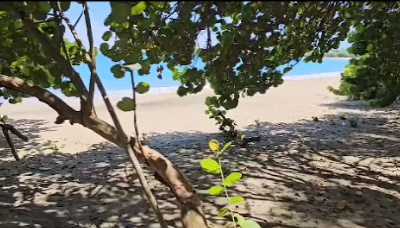SCARBOROUGH, Tobago, CMC – One week after a British national was attacked and severely injured by a shark, Tobago authorities Friday announced the re-opening of all beaches on the island.
The rare shark attack forced the (OCS) to thank fishermen and stakeholders for their patience and cooperation following the closure of the beaches.
In a statement, it said the beaches along the island’s western coast had been closed with immediate effect on April 26, after a bull shark attacked and injured a British tourist, Peter Smith, 64, at Turtle Beach.
It said Smith was successfully treated at the Scarborough General Hospital and later airlifted to the Jackson Memorial Hospital, Miami, Florida and that the Tobago Emergency Management Agency (TEMA) met with various stakeholders to refine the Tobago Marine Safety Plan.
Last weekend, the Tobago House of assembly (THA) revoked a decision to offer TT$10,000 (One TT dollar=US$0.16 cents) to registered fishermen who are able to capture the bull shark that attacked Smith.
THA Chief Secretary, Farley Augustine, told reporters that there was “some confusion” regarding the reward.
In its latest statement on Friday, the OCS thanked those involved in the co-ordinated efforts as well as the public, tourism stakeholders and the fishing community for their understanding, patience and co-operation during the period of beach closure.
Meanwhile, the non-governmental organisation, Fishermen and Friends of the Sea (FFOS) is calling for legislation to be enacted to protect sharks in local waters.
In a statement FFOS Corporate Secretary Gary Aboud said Trinidad and Tobago needs to do its part to protect vulnerable and endangered species. The group wants the government to ban all shark exports immediately.
Aboud said in 2014 Cabinet approved a note for the implementation of a national ban on shark finning after it was reported that this country ranks sixth worldwide for the volume of shark fins supplied to Japan. However, 10 years later, no legislation has been implemented.
According to the International Union for Conservation of Nature Red List of Threatened Species, more than one-third of sharks are threatened with extinction and they are one of the most endangered species in the marine environment.
Aboud said a ban would demonstrate Trinidad and Tobago’s commitment to aquatic conservation and ensure the long-term viability of its marine ecosystems. International fishing fleets would be banned from catching sharks in local water and the landing of all endangered sharks would be forbidden, particularly those protected by the Convention on International Trade in Endangered Species of Wild Fauna and Flora.
“FFOS is calling on our government to sit up and respond to critical issues of sustainability, which are required for the long-term stability and balance of all human societies. We cannot afford to mismanage our species,” Aboud said.






More Stories
Plans underway to export sweet potatoes to UK
Reducing court backlog high on agenda
More protection for children